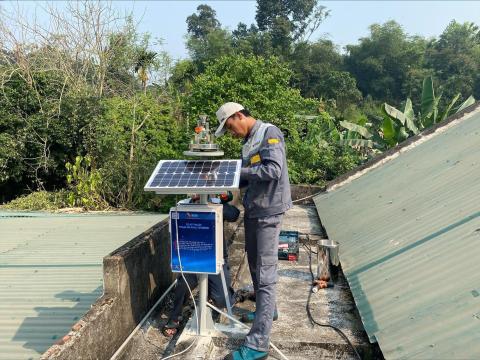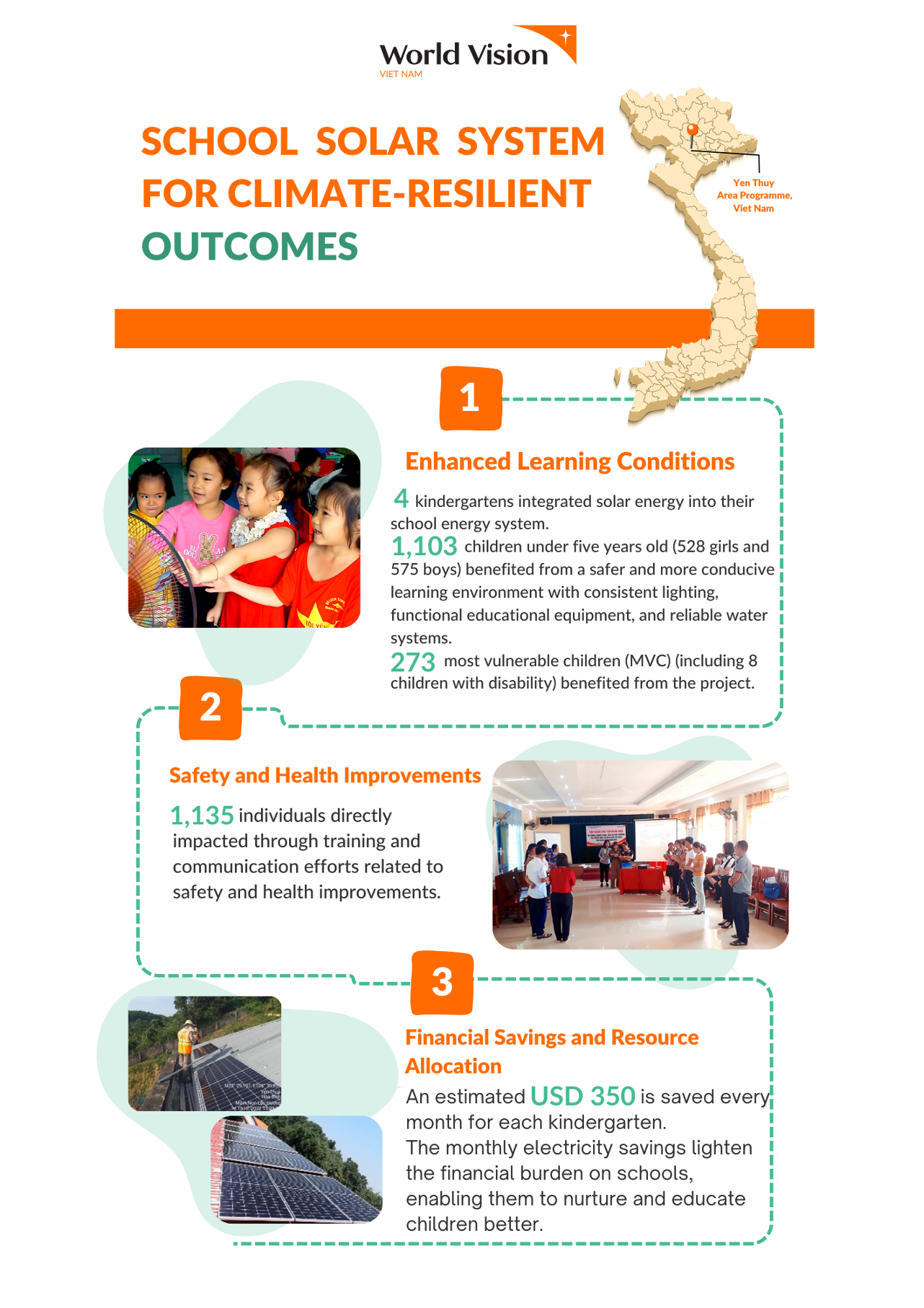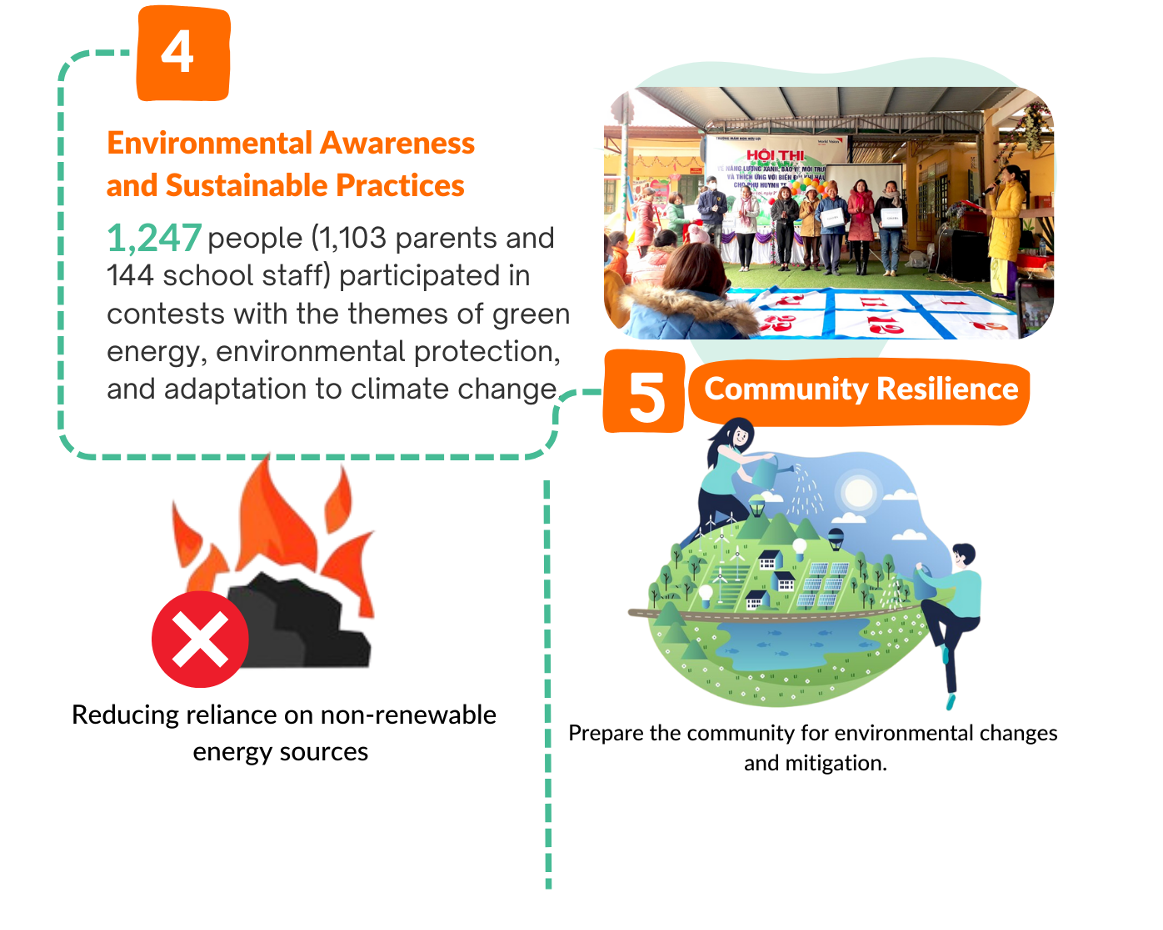Case studies: Solar power for climate-resilient communities

A need for cost-effective and clean energy for kindergartens
In Viet Nam, the electricity supply is still insufficient in rural and remote areas due to some economic reasons while natural power has not been fully utilised yet. Considering this context and the blessed abundant sunlight for Viet Nam, solar power can be a green solution for the community here.
Take Yen Thuy district, one of World Vision International Viet Nam’s Area Programmes, for an instance analysis. The area is located in the hilly western region of Hoa Binh City, Viet Nam. It is characterised by its challenging financial conditions, particularly affecting the quality of life for children. The kindergartens in the area have long struggled with weak and unstable electricity supplies, leading to significant disruptions in daily operations. Frequent power outages and insufficient energy have impacted the functionality of essential school facilities, such as lighting, educational equipment, and water systems.
These conditions have created unsafe and poor learning environments, hindering students' education and well-being. The instability in the electricity supply has had far-reaching consequences. Classrooms often remain dark and uninviting, making it difficult for students to concentrate and engage in their studies. Essential educational tools and technologies cannot be reliably used, limiting the quality of education that teachers can provide.
Additionally, the lack of stable electricity affects the schools' ability to maintain proper hygiene standards, as water systems are frequently rendered inoperative, posing health risks to the children.
On the other hand, Viet Nam is among the countries with remarkable potential in solar energy. According to a survey on solar radiation, sunlight resources were abundant in the country with 1,800 to 2,100 sunny hours annually, which can be used as a source of alternative power supply. The government indeed encourages businesses, and local people to push up the percentage of solar power generation reach to 17% by 2025.
Considering the high stakes of natural disasters in the country, solar power also can be a green solution for Viet Nam, a disaster-prone country, driving towards sustainable development. Yen Thuy in particular is frequented by flash floods, landslides, forest fires, heavy rains, record record-high temperatures. In five recent years, there have been clear signals indicating that the district is negatively affected by climate change. Temperature is climbing up 0.320 °C every year, prolonged drought also frequent the areas to the extent of 4-5 months/year in comparison with just 2-3 months in the past. The year 2018 has witnessed a peak temperature of 42°C, the highest record in the past 46 years.
The Climate Resilience in Action
The "Solar Energy Solution for Preschools in Four Project Communes under the Yen Thuy Area Programme" was meticulously designed to address the critical issue of unstable electricity supply in rural schools. The project's primary objective was to enhance the learning environment and promote children's health care by providing a stable and renewable energy source.
Project Planning and Approval: In August 2022, after receiving approval from the Hoa Binh People's Committee, the project commenced with a detailed survey and planning phase conducted by Vu Phong Energy Group. This phase involved assessing the energy needs of the target preschools and designing customized solar power systems to meet these requirements.
System Specifications: Each of the four kindergartens—Lac Luong, Lac Sy, Lac Hung, and Huu Loi—received a solar power system with a capacity of 8.1 kWp. These systems were equipped with 18 high-quality solar panels, auxiliary frames, and conductors, all designed to endure for over 30 years. The robust design ensures long-term reliability and minimal maintenance, making it a sustainable solution for the schools.
Installation and Training: The installation process, completed in just one month, was carried out by Vu Phong Energy Group's engineering team. The team's expertise ensured that the solar power systems were installed efficiently and safely. Alongside the installation, a series of training sessions were conducted for the teachers and school staff. These sessions covered the operation and maintenance of the solar systems, as well as broader topics on environmental protection and climate change adaptation. This comprehensive training aimed to empower the school communities with the knowledge and skills needed to sustain the benefits of the solar systems.
Operational Integration: The newly installed solar power systems now provide a reliable source of clean energy, significantly improving the operational capacity of the schools. Classrooms are well-lit, educational equipment operates smoothly, and water systems function reliably, creating a safe and conducive learning environment. The solar systems also reduce the schools' dependence on traditional energy sources, leading to cost savings on fuel and electricity.
Environmental and Educational Impact: Beyond the immediate operational benefits, the project has had a profound impact on environmental sustainability and education. By integrating solar power into the daily operations of the schools, the project promotes the use of renewable energy and reduces the carbon footprint. Additionally, the children gain early exposure to renewable energy concepts, fostering a culture of environmental stewardship from a young age. This educational aspect is crucial in building long-term community resilience to climate change.
The "Solar Energy Solution for Preschools" project in Yen Thuy district exemplifies how targeted climate actions can address critical infrastructure challenges while promoting sustainability and resilience. The successful implementation of this project serves as a model for similar initiatives in other regions, demonstrating the transformative potential of renewable energy solutions in enhancing educational environments and community well-being.
Highlighted outcomes from the green initiative


The "Solar Energy Solution for Preschools" project has successfully enhanced the educational environment and promoted climate resilience in the community. By providing reliable solar power, the project has ensured safer and better-equipped learning spaces for young children, leading to improved educational outcomes and heightened environmental consciousness.
The "Solar Energy Solution for Preschools" project has transformed learning conditions in four preschools by providing stable electricity, resulting in consistent lighting, reliable educational equipment, and functional water systems, thereby improving academic performance and well-being. Financial savings from solar power have allowed schools to enhance facilities, purchase educational materials, and improve childcare services, reducing the financial burden on parents. The project has raised environmental awareness and sustainable practices among children, teachers, and parents, fostering a generation of environmentally conscious individuals. Additionally, by reducing reliance on non-renewable energy, the community has become more resilient to climate change, empowered with knowledge and skills for sustainable living, ensuring long-term well-being and preparedness for environmental challenges.
Sustainable impacts on the community
The success of the "Solar Energy Solution for Preschools" project serves as an exemplary model for integrating renewable energy solutions into community development programmes. The project's holistic approach, addressing both immediate infrastructure needs and long-term sustainability goals, demonstrates the far-reaching benefits of such initiatives. It contributes to the United Nations Sustainable Development Goals (SDGs) of quality education (Goal 4), affordable, clean energy for all (Goal 7) and climate actions (Goal 13).
The project outcomes have not only improved the educational environment for young children but have also fostered a culture of environmental stewardship and community resilience. The project stands as a testament to the transformative power of renewable energy solutions in enhancing the quality of life and promoting sustainable development. It provides a blueprint for similar initiatives in other regions, highlighting the importance of collaborative efforts in achieving sustainable and impactful community development.
Furthermore, the project has lasting impacts on the community since they are now empowered with environmental stewardship knowledge and renewable energy system operational skills.